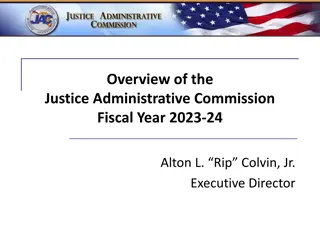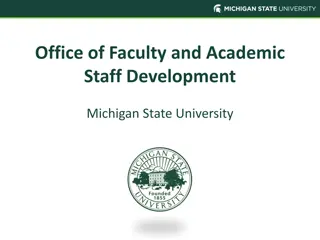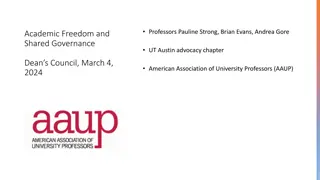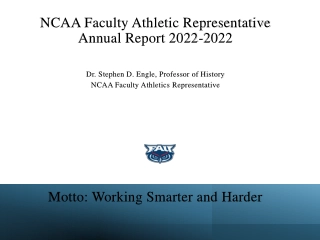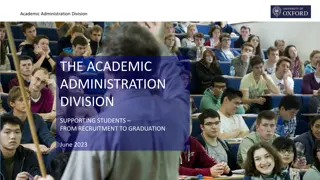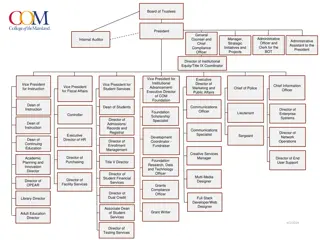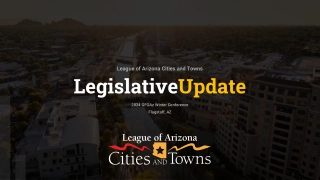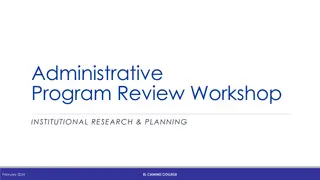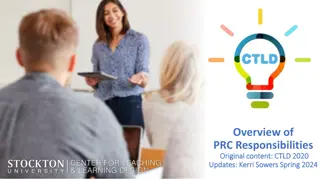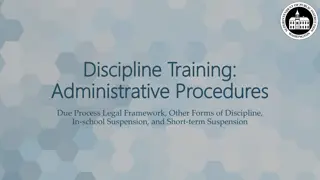Responsibilities of Deans and HODs in Academic and Administrative Settings
Definitions and statutory basis of deans and heads of departments, their roles in promoting proper staff and student relationships, and the academic structure in a university system, as outlined in the University of Lagos Act. Emphasis on the authority, roles, and responsibilities of deans and HODs in university governance.
Download Presentation
Please find below an Image/Link to download the presentation.
The content on the website is provided AS IS for your information and personal use only. It may not be sold, licensed, or shared on other websites without obtaining consent from the author. Download presentation by click this link. If you encounter any issues during the download, it is possible that the publisher has removed the file from their server.
Presentation Transcript
Academic and Administrative Academic and Administrative Responsibilities of Deans and HODs Responsibilities of Deans and HODs Promoting Proper Staff and Student Relationship Promoting Proper Staff and Student Relationship Professor Ayodele Atsenuwa Deputy Vice Chancellor (Development Services) University of Lagos Akoka
Outline Outline 1. Definitions and statutory basis 2. Significance of theme of presentation 3. The university system and its governance 4. The university: a state on its own 5. Structure/Hierarchies of units and organs 6. Values and guiding principles 7. Authority, roles and responsibilities Deans 8. Authority, roles and responsibilities Heads of Departments
Definitions and statutory basis Definitions and statutory basis Meaning of Dean and Head of Department Dean comes from the Latin decanus, first "commander of ten soldiers," and then "head of ten monks in a monastery," from the Greek word for "ten," deka. In the context of UNILAG, a dean is the Head of a Faculty or a School. The components of a Faculty in UNILAG are departments and academic units so placed under the Faculty. Head of Department means the head of a teaching unit established and designated under the University statute as a Department. As a component of the Faculty, the Head of Department is necessarily responsible to the Dean.
Paragraphs 6-8 of the Fourth Schedule of the University of Lagos Act as amended provide for the organization of academic work in the University. Para. 6: The academic work of the University shall be distributed, in such manner as may be prescribed, among the colleges and such faculties, schools, institutes or other teaching units as may be established by regulations. Para. 7: (1) Each faculty, school, institute or other teaching unit of the University established by regulations shall be under the direct control of a board of studies. (2) Each board of studies shall consist of- (a) the Vice-Chancellor and the Deputy Vice-Chancellor; (b) such of the teachers assigned to the faculty, school, institute or other teaching unit as the Senate may determine; (c) such persons, not exceeding four in number, whether or not members of the University, as may with the specific or general approval of the Senate be appointed by the board of studies to be members of the board.
Para 8(4) Functions of the Board of Studies Subject to the provisions of the Act, it shall be the function of each board of studies- (a) to advise and report to the Senate on all matters relating to the organisation of education, teaching and research in the subjects of the faculty, school, institute or other teaching unit, including curricula and examinations; (b) to consider the progress and conduct of students in that teaching unit and to report thereon; (c) to recommend to the Senate persons for appointment as examiners; and (d) to deal with any academic matters referred to it by the Senate. NOTE: Where a board of studies does not include all the teachers assigned to the faculty, school, institute or other teaching unit in question, there shall be an assembly of those teachers which shall have such functions as may be prescribed. This explains why the SPGS has an Academic Board and an Assembly of Teachers
Para. 9: Deans of teaching units 1. In the case of each faculty, school, institute or other teaching unit established by regulations, one of the professors assigned to that teaching unit shall be Dean of that teaching unit. 2. The Dean of a teaching unit shall be appointed in such manner as may be prescribed and shall hold the office of Dean for such period and on such terms as may be prescribed. 3. The Dean shall be chairman at all meetings of his board of studies when he is present; and when he is not present, such other member of the board present at the meeting as may be prescribed, or in that member's absence such other member of the board present at the meeting as the board may appoint for that meeting, shall be the chairman at the meeting. 4. It shall be the function of the Dean of a teaching unit to present to Congregation for the conferment of degrees persons who have qualified for degrees of the University at examinations held in the branches of learning for which responsibility is allocated to the board of studies of that unit.
Significance of theme of presentation Significance of theme of presentation The significance of the theme of this presentation is premised on the exigency of Fulfilling the purpose and mandate of the university Evolving an effective system to ensure compliance with law The University of Lagos is a creation of statute which expressly spells out its objects and creates a structure made up of various organs for its effective working to the end of realising the objects.
The objects of the University of Lagos are: a) to encourage the advancement of learning and to hold out to all persons without distinction of race, creed, sex or political conviction the opportunity of acquiring a higher education; b) to provide courses of instruction and other facilities for the pursuit of learning in all its branches, and to make those facilities available on proper terms to such persons as are equipped to benefit from them; c) to encourage, promote and conduct research in all fields of learning and human endeavour; and d) to undertake any other activities appropriate for a university of the highest standard. In furtherance of these objects, the Act creates various offices including those of Deans and Heads of Departments.and the imperative of being true to cause makes addressing this theme compelling.
In law, universities are legal persons with rights and responsibilities section of the University Act. As legal persons, offices of the corporate entity may be construed as the brain and mind and the decisions and actions of holders of these offices are deemed the decision of the university so that the university is deemed to have acted and is personally liable for its own actions) OR other physical parts of the entity e.g. the limbs and the actions of holders of these offices are not deemed to be the university. s personal actions although the university may still be legally responsible for their actions (vicarious liability for the actions of an agent).
Deans, Directors and Heads of Departments, etc. are appointees of the Vice-Chancellor. As appointees of the Vice-Chancellor, by the doctrine of corporate liability, the decisions and actions (including actions) of Deans, Directors and Heads of Department are deemed the action of the Vice-Chancellor and so the actions of the University Though selected through a process of election, Deans are appointees of the Vice Chancellor and by the deployment of one or more of the any doctrines of corporate liability attribution, their actions and decisions may be construed as the decisions of the university.
The university system and its governance The university system and its governance The university is a mini-universe conceptualised to be run as a democratic state Arguably, the best example of a democratic society an ideal state working on the principle of Government of the People by the People for the People Shared governance by diverse stakeholders Representatives of the public whose funds finance the institution and who have an interest in knowledge creation Representatives of university community members, all of whom are jointly responsible for the governance of the community Exemplified by the shared roles of Council and Senate
Participatory and inclusive governance most members of the community participate in its governance through inclusive organs such as congregation and convocation, through representation of various interest groups in the different organs of f the institutions e.g. Senate, Council etc., through self- representation as in membership of all academic staff in the Departmental meeting and Faculty Board of Studies, through committee system in which members of the community participate. In sum, A system of shared powers where the structure of authority combine both directive and non-directive style of management. A system of inclusive and participatory governance where all community stakeholder share power for the good of the community.
The university: a state on its own The university: a state on its own Parallels and Analogies Country States/Provinces/Regions Districts/Local Governments University Faculties/Colleges/Schools/ Institutes Academic Departments/Centres Library With power to make laws and regulations for its good governance Serviced by: Ministries, Departments & Agencies (by whatever specific name known) CITS Works & Physical Planning Dept Medical Centre Security Unit
Structure/Hierarchies of units and organs Structure/Hierarchies of units and organs Vice Chancellor Senate Council Dean Dean Vice-Chancellor Head of Dept. Head of Dept. Dean Head of Dept.
Vice Chancellor Students Dean/Provost Staff Head of Dept
Values and guiding principles Values and guiding principles The deducible values and guiding principles of the organization of the university are thus: Shared governance Democratic governance Accountability for public trust (re: resources invested) Accountability for mandate of knowledge creation Quality service/product delivery
This invokes that leaderships primal consideration is the best interest of the university defined by reference to its defined aims, objectives and proprietary interest. This also invokes that leadership recognize that students are the clients/customers of the business of university and quality service/product delivery to them is primal the public are the investors who expect return on investment staff academic and non-teaching as human capital are just as valuable as capital assets to the investment. They are critical resources invested in making the products of the products for which universities exist scholarship and scholars
Authority, roles and responsibilities Authority, roles and responsibilities the Dean the Dean Deans/Heads of Department/Academic Directors are all part of the university management albeit each operates at a different level. Their powers, roles and responsibilities are similar but each operates at its own level and these powers, roles and responsibilities are circumscribed by what the law permits for each level. Deans are heads of Faculties and are directly responsible to the Vice- Chancellor (or the Provost as the case may be) for all matters relating to the academic, managerial and financial affairs of their Faculties.
Deans report to the Vice-Chancellor directly but work closely with other organs of the University system e.g. Registrar, Bursar, Director of Research Management, Dean of Student Affairs, and their Heads of Department to ensure that university strategic goals and objectives are pursued according to plan. Deans provide local direction and resources implementation of university rules and regulations, federal, state, and local laws as applicable e.g. Data Protection Law, and where applicable a sponsoring body s policies and procedures (a research grant donor such as TETFund). Simply, Deans keep their team accountable to University Statutory Mandate and its Strategic Plan for the realization of the mandate.
Deans may have their own visions or understanding of the leadership needs of their Faculties but they must ALWAYS align this to the vision and leadership needs of the university to advance the its teaching, research and service missions. Deans advance the University s vision and goals through the intentional creation of a strategic academic business plan and future initiatives. Deans lead the educational, research, scholarly and public engagement activities of their college or school and this must be done through planning, implementation and evaluation initiatives that ensure success, relevancy and sustainability. NOTE: They do this in conjuction with the Board of Studies.
Academic and scholarly leadership teaching and research Deans are expected to create a positive work and learning environment within their Faculties to foster scholarship and knowledge creation. Deans verify the adequacy of teaching, monitor academic integrity, confer degrees, and are responsible for student admission, and academic progress. Deans are responsible for the ethical conduct of research and for establishing and maintaining a culture of compliance and integrity among faculty, staff, and students.
Deans lead compliance with quality assurance and accreditation standards. Deans advocate on behalf of staff and students and create initiatives to foster positive student experience and qualitative learning. Deans are expected to actively participate in the university governance system in order to serve as a bridge between the tiers below them and the tiers above them.
Personnel leadership Deans have overall responsible for recruitment, appointment and promotion of academic staff in their Faculty through the Faculty Appointments and Promotions Board Deans work with their HODs to create hiring plans for their Faculty and participate in the recruiting and hiring process for faculty and staff. Deans participate in the review of each faculty application for promotion and they lead the Faculty A&P Committee to provide recommendations to the Senate through the A&P Board. Deans are mentors and coaches of their team members (i.e. staff and students in the academic units and programs.
Deans ensure meaningful performance evaluations of faculty and staff are regularly conducted. Deans manage the resources of their Faculty applying the rule of best interest of the Faculty and its constituents the academic departments, individual staff (teaching and non-teaching) and students
Financial leadership Deans are responsible for the effective management of the financial resources of their college or school. Deans develop and implement strategies for providing competitive salaries to faculty and staff which includes planning with the elected faculty council and executive leadership for the use of the tools available in the Faculty Salary Policy. Deans develop capital and minor repair budget proposals for their college or school and ensure the effective management of allocated resources.
Managerial leadership Deans enhance a culture of collaboration within their units to include meaningful engagement with faculty, staff and student governance councils and committees. Deans ensure that their college or school adheres to University policies and procedures. Deans manage the allocation of space within the facilities assigned by the provost for the use of their college or school. Deans enhance a culture of diversity, equity, and inclusion within their college or school.
Engagement with staff (academic and non-teaching) and students As the people s warden/stewards at the Faculty level, Deans nurture, facilitate growth and development of faculty, staff and students. Deans are role models and should set and uphold high standards for faculty, staff and students.
Engagement within the University of Lagos but beyond the Faculty Deans actively participate in the Senate and other meetings (e.g. Provost and Deans, A&P Board, Development Committee) and activities of the University to provide advice to the Vice-Chancellor. Deans lead and participate on University committees to support University requirements and advance the University s vision and goals. Deans participate in University events e.g. inaugural lectures, seminars, conferences colloquia, as the representative of their Faculty or school. Deans collaborate with other academic leaders to advance University-wide and interdisciplinary initiatives.
External relations and engagements beyond the University Deans engage with external stakeholders including alumni, donors, employers of graduates, and interested community organizations to solicit external input regarding the impact of their college or school. Deans develop and implement fundraising strategies to obtain needed philanthropic support for Faculty initiatives. Deans engage stakeholders in meaningful interactions with the school that foster pride, advocacy and private support. Deans enhance the stature and professional standing of their college or school among peers and relevant constituencies.
Authority, roles and responsibilities Authority, roles and responsibilities - - HODs HODs The Department is the primary level of engagement of every student who comes into the university system for an academic discipline. Students get admitted to degree programmes that are domiciled in Department (although in a few exceptional cases like Law and Pharmacy where the student s course is domiciled in the Faculty at large). Thus the HOD is the primary level management officer with whom a student interacts
Heads of Department have a key role in ensuring that staff are provided with appropriate opportunities to fulfil their academic potential in support of the departmental plan. This includes providing staff with access to the necessary support to enable them to contribute fully and develop their skills and experience, including providing opportunities to progress through promotion, in accordance with their talents, aspirations and expertise. Heads of Department are also role models for other members of staff in the pursuit of academic excellence.
HODs should ensure that they are familiar with the current arrangements so that colleagues who may wish to apply for promotion are advised appropriately. For example, the timing of publications which may not be cited, the type of publications that may not be accepted as academic publication HODs are responsible for consulting appropriate senior colleagues on applications for promotions. HODs should encourage appropriately qualified staff to apply for promotion, bearing in mind that some people underestimate their own achievements. HOD should be set from the start of employment to work with junior faculty directly or through academic mentors to advise and help them consistently identify which areas they need to develop in.
Students - academic departments exist primarily to organize the delivery of instruction to students and faculty members are to provide/support engagements in scholarly research alongside students. Hence, critical roles of HODs encompass: Coordination and supervision of instruction in the departments to the end that students receive qualitative education Curriculum planning Teaching assignments Chief Examination Officer Judicious allocation and use of resources for the realisaton of the above at the departmental level.
Qualities of a great academic dean or HOD Qualities of a great academic dean or HOD After successfully attaining a high enough academic position as to be eligible for appointment, there are additional qualities that are needed to be an effective academic dean or HOD and these may be summed up as: Leadership - managerial competence (skilled combination of directive and non-directive management style) Coach and mentor Accountability and accessibility Integrity Communication Adaptability and innovativeness (ability to embrace change) Respect for difference/diversity ability to take on constructive criticism and difference of opinion Value for others good leaders strive to make others (whether student or staff) feel important
Values - all of above must be imbued with a good dose of Fairness Objectivity Transparency Respect for others Respect for difference Empathy Student-centredness
How can I do things differently? How can I do things differently? Determine to be the best ever Dean or HOD, Be intentional about adding valuein office rather than just holding fort and maintaining traditions unquestioningly Acquaint yourself with the University rules and regulations Determine to be an active and effective player in the field. Recognise AND ACCEPT that the world has made some significant shifts in the context of university relationships lecturer qua students, senior faculty qua junior faculty, academic qua non- teaching staff. Underlying these shifts is the move away from authoritarianism and patriarchy.
Equip self for leadership through training and retraining. Many of us are not natural born leaders(that is anyone is, in fact) and ability to research and teach which are the key criteria for progression to academic leadership does not always mean one is adequately equipped for leadership as people and resource managers. REMEMBER that its never to late to start learn and there s no end to learning. Be a constant learner, be ready to learn and unlearn management and embrace new knowledges and skills. 21stcentury leadership is more complex and requires that leaders cultivate an array of skills
What can management do to help me? Delineate the role and responsibilities of academic deans more clearly and document. Delineate the role and responsibilities of Heads of Department more clearly and document Communicate/provide easy access to university rules and regulations by making them easily accessible for reference Ensure consistent application of rules to ensure that guidelines are clear and evolve an overarching institutional culture of fairness. De-emphasise reliance on training by unstructured mentoring and coaching Provide training for Deans and HODs using different training modes such as directed learning such as this seminar offers and self-paced learning through digital platforms Provide adequate resources to support upgrade and maintenance of facilities.
Useful readings European Business Review, Seven Essential Qualities In A Great Academic Dean available at https://www.europeanbusinessreview.com/seven-essential-qualities- in-a-great-academic-dean/ Robert F. Brunner, The 3 Qualities That Make a Good Dean The Chronicle of Higher Education available at https://www.chronicle.com/article/the-3-qualities-that-make-a-good- dean/




